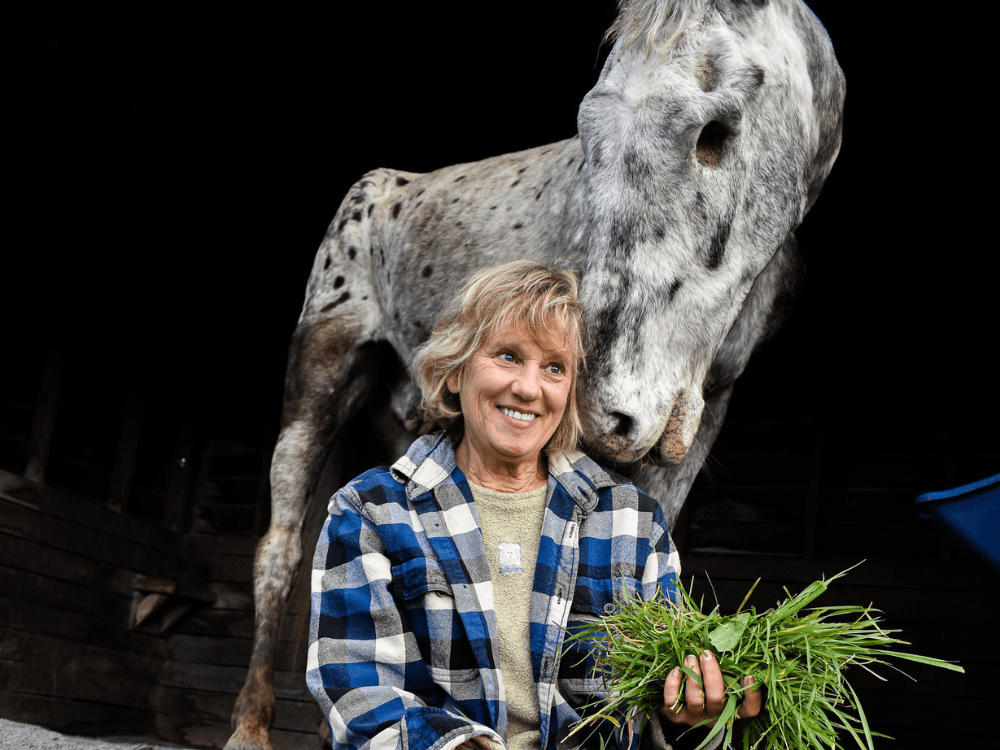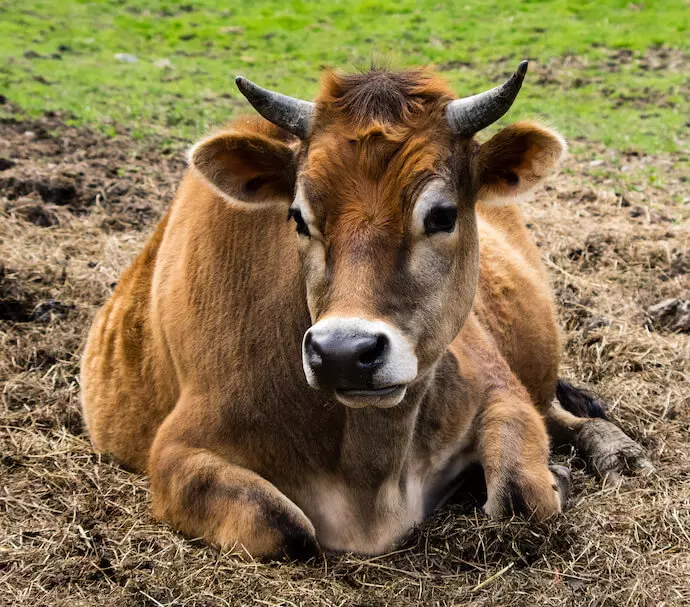
May You Run Through Grassy Fields: Goodbye to Our Beloved Buddy
In the winter of 2007, we couldn’t possibly have known that an aging, nearly-blind horse who came down our driveway at Catskill Animal Sanctuary would change our lives forever. But he did, and 15 years later, we’ve just said goodbye. Our hearts are simultaneously heavy, relieved for an animal who was finally ready to move on, and grateful to an old boy who helped us discover what we’re made of. Buddy was a 20-year-old Appaloosa who was rapidly losing the last bit of remaining vision in one eye. His humans were unable to find a boarding facility willing to accept him when they sold their farm. “Too much liability,” the facilities said. Having recently lost our first blind Buddy, we agreed to take this boy in need. He would be our fifth blind horse, after all: we were confident that we had the experience to help him adjust successfully to his new home. Buddy was a striking horse. He was not “gray,” but rather salt and pepper–a beautiful blend of jet black and pure white, with dalmation-sized black spots from his shoulder to his tail…mostly concentrated on his beautiful Appaloosa butt–the “blanket,” as horse people call it. Buddy had a beautiful blanket. He was also quite slight, built far more like a two-year-old Thoroughbred than like the typical sturdy Appaloosa. We welcomed Buddy with the many reassurances that we offer all our new arrivals, and we added in our practices for acclimating the blind. Helping blind animals memorize their pastures, their daily walk to and from the barn, where the water trough is…all of this and so much more helps them build confidence and trust in what would otherwise be a terrifying situation. So we walked Buddy around and around the perimeter of his pasture, banging on the fence line as we did so. We walked him down the gentle slope outside his shelter and back in again. We taught him the words we teach all blind horses: Up. Down. Stop. Water. Choppy. We spoke gently when we were with him. We groomed him. A lot. If Buddy couldn’t see us, we were going to make sure that he could hear and feel that we were on his team. Buddy instantly rewarded us with trust. Within days he used our backs as scratching posts when he had an itch. He walked eagerly to us when we called his name, and stopped on a dime when we asked him to. We laughed when he worked at our pockets for the treats he knew were there, and we made a game of this ritual. Buddy had an extreme and delightful underbite, and another favorite game was to try to “bite” the palms of our hands. He couldn’t, of course—his bite wouldn’t allow him to—but we played along, encouraging him the entire time. When he was with his new humans, Buddy was a happy boy. But trusting his environment was a taller order. One snowy morning when he’d been with us for a few days, Buddy and I were walking in the woods. This shared time was one way we built our bond, and we both enjoyed it immensely. While I have no idea what startled him, Buddy was suddenly on his hind legs, rearing frantically. “It’s okay, Bud,” I said over and over, trying to use words to soothe a blind and terrified animal. It didn’t work. I pointed us towards the barn, and by circling him the entire walk back, finally got there in what was the longest half-mile walk of my life. What the heck had happened? I wondered. Eventually Buddy settled, and I began several weeks of chiropractic visits to recover from the experience. It happened again soon afterwards. Buddy was eating peacefully in his stall when the wind picked up outside, and Buddy reared and spun in circles in his 12×12 stall. And again when a gun went off in the distance. Oh. Buddy panicked when he heard sudden and unfamiliar sounds. His “fight or flight” response kicked in, and his urge was always to flee. For blind animals, that desire generally translates to frantic circling, and Buddy circled like he was on steroids. We had our work cut out for us. We learned from his original humans that Buddy had been hit by a car when he escaped from his pasture, and wondered whether he had the equine version of PTSD. No matter the root of it, his impulse to rear and circle frantically was dangerous to us and to him. We decided to change Buddy’s ritual. Rather than turning him out during the busiest part of the day, when any normal “sanctuary sound”—a tractor, a blowing tarp, the squeal of a delighted child on a tour—was more likely to trigger him, we took him out in the early evenings. We clipped his halter to a 50-foot training rope called a “lunge line,” and Buddy grazed freely as we spoke to him. “We’re right here, Buddy,” we whispered. “We’re right here.” When he reacted to a sound, we’d pull him gently toward us, signaling, essentially, that he was safe. That we had his back. It took many, many months of patient work to help Buddy’s brain reset so that an unexpected noise was just that…and not a threat to his life. Did he lose his reactivity altogether? He didn’t. For the next sixteen years, Buddy—otherwise the playful, impish, affectionate goofball—still reacted to unanticipated sounds. But with time and work, his reaction softened dramatically: Buddy stopped spinning like a top in his pasture. He was no longer a threat to himself or to us. He could, and did, live a mostly extremely happy life, cared for by humans who adored him and with various companion horses to offer good company, both during daytime turnout and at night, when a cutout “window” on the wall allowed Buddy and his next door neighbor to touch, to lick, to fall asleep together—to communicate with and comfort each other. For over 15 years, the CAS team appreciated and celebrated all that was good about “The Budster”, “BuddyBoo”, “BooMan”, “BudBud”. He was an extraordinary teacher to those of us who’d never worked with such a challenging animal, and a greater teacher, still, to unsuspecting visitors who were invariably taken back by Buddy’s empty eye sockets (when Buddy became fully blind, the vet determined that his non-functioning eyes were extremely painful, so as we’ve done with numerous blind animals, we had the painful eyes removed). “You’re going to feel sorry for this horse,” we’d say to tour groups as we approached his field, “for about 20 seconds,” because that was exactly what happened: people gasped when they saw him. Many cried. But then the magic happened. “Buddy!!” we’d call, and he would move confidently in our direction, often trotting. “Stop!” we’d instruct, and sure enough, inches before plowing into us, Buddy stopped. He scratched his ears, cheeks, forehead against our backs, he searched pockets for treats. He reveled in the touch of strangers. When he’d had enough, he’d leave us, satisfied, and would often drop to the ground and roll with abandon. In other words, Buddy was blind, but he certainly was not disabled. He was so very clearly living with joy, and showed thousands of visitors over the years that just like humans, animals adapt in order to live their best possible lives. It was in his aging, though, that Buddy offered his most lasting lessons. Once he turned thirty (97 in human years!), it became a challenge to keep Buddy’s weight up. We adjusted his diet, the number of meals he got per day, and how he was blanketed. He stayed inside on especially frigid days. Still, each winter, Buddy lost weight, and the animal care team and I would look at each other and say, “This is probably Buddy’s last winter.” We said that in 2017. And again in 2018. “It’s probably his last winter,” we said in 2019 and 2020, and we said it again in 2021. For five years, each time it seemed like the ancient boy’s time was drawing to a close, something surprising happened: his appetite increased, or our extraordinary health care team tried a new treatment, a new medication, or both that improved his comfort—to the point that just a few weeks ago a horse who was literally 112 in human years still often dragged us to the pasture. Oh, yeah, I forgot that part of his story: “walking Buddy,” even as an old man, often meant either holding on for dear life to contain him…or trotting along with him. The boy had some energy. I would have imagined that our spirited Budster might have given in to the discomforts of old, old, old age: the stiff joints, the digestive issues, the need for assistance if he lay down with his legs at an awkward angle. But he didn’t. Buddy had no desire to pack it in, and so, stunned as we were each year when he made it through yet another winter, it became our privilege to keep him comfortable, and to wait until he told us that he was done. On his last day, that is exactly what happened. We found him down in his stall in the morning, exhausted from trying to stand. “I’m right here, Bud,” I whispered as I sat down next to him. Buddy fell sound asleep the moment I lifted his head into my lap, and, grateful for our presence, started to dream, his legs twitching much like a dog’s do. It was time to let him go, we all agreed: Buddy had run out of gas. Some twenty minutes later, Buddy woke, and was determined to stand. I called the team, and aided by dedicated Caregivers, Jared and Sam, Buddy stood, I slipped on his halter, and we made our way out to his pasture. Buddy would feel the sunshine one final time. While we waited for the vet to arrive, Buddy grazed a bit, circled a bit, and stopped on occasion to acknowledge his human friends…a throng of them, of course, who’d been called with the news. Buddy’s passing was as peaceful as they come. He fell asleep in the summer grass, the sun warm on his face, dreaming, I hope, of running on pain-free joints, with perfect vision, through grassy fields. So long, precious horse. Thanks for the laughs, the bad back, and the lessons. As we reach the peak of summer in our 21st year as a sanctuary, we face the sorrow of another insurmountable loss. We recognize that this particular difficulty never truly changes. Each animal who arrives at CAS becomes a teacher for those of us who work closely with them. Buddy was certainly no exception to that rule. No matter the species, age, or physical and psychological state when they arrive, the animals who’ve come down our driveway over the past two decades—thousands of them, often from heinous circumstances—reinforce the truths upon which our work is built: Animals are as individual as we are. They experience every emotion and sensation we do. And they want their lives as much as we want ours. Buddy was a complicated horse. There were many times when we questioned whether it was time to let him go, but each time, Buddy told us, “No. Not today.” The lessons that he offered have made us better caretakers, more patient and more open human beings, and a stronger organization. His ashes will be spread in his pasture. His spirit will remain. Buddy will live on in every blade of grass here at CAS, and in every heart lucky enough to have known him.
Animals As Teachers, Herd Around The Barn, Saying Goodbye
Tagsanimal rescue, animal sanctuary, blind horse, horse, horse sanctuary, horses, horses living together, memorial, rescued horse
Comments are closed.






WOW what a precious boy and thank you for loving him giving him a home and sharing his story. I sit here crying over your heart break but you listened to him each time you thought he was I guess he told you not yet. You knew when that day came and you gracefully gave him a very peaceful passing Thank you
Linda, from all of us at Catskill Animal Sanctuary, thank you for your kind words. They go a long way towards healing our hearts.
Bless all of you for giving Buddy his best life and loving him so….he was truly blessed. My heart aches for your loss. May your memories give you some comfort knowing how much he was loved and cared for. Rest in Paradise sweet Buddy💔🌈
Thank you, Kristen, from all of us at CAS. The memories of him, and the lives he touched, all these things are a source of great comfort to us.
I had the privilege and honor of meeting and spending time with Buddy. Lessons learned. What a beautiful being. I hung on to every word of your memorial to him. Run free pain free you beautiful boy. I will miss seeing you. Thank you to ALL the staff at CAS for giving him the bestest life. It’s because of all of you that Buddy’s last winter didn’t happen in 2017, 18, 19, 20 or 21.
Thank you so much for this, Sherie! Glad beyond words that you got to spend time with our Buddy. We’re so grateful for you and Jeanine. Lots of love from the whole CAS family.
Thank you for this beautiful story. We will be visiting the sanctuary and staying at The Homestead on October. I am sad not to have met Buddy, but filled with gratitude for what you bring to the lives of precious animals.
Compassion and wonder make life worthwhile
Thank you so much for this lovely comment. We wish we could have introduced you to him. Can’t wait to see you at The Homestead (it’s beautiful here in the fall!)
I’ve read this many times. It’s beautiful, emotional. I had the honor of visiting Buddy IV this year on our shared May birthday. We shared such a special moment that I will never forget. I’ve been afraid to ask, was it Buddy IV that passed?
Thank you so much for all you do and the love and support you provide to the voiceless. peace and love.
Hi Christine, it was Buddy III who passed. Buddy IV is still with us and we’re thankful for every precious minute we get to spend with those beautiful old blind horses. We’re so happy you spent your birthday with us! Hope to see you again soon. Lots of love from the whole CAS team
Eternal thanks to you for loving, caring, and living large with such an amazing soul.
I cried tears, of empathy and compassion, a like understanding, a heartfelt elation for Buddy’s fortitude, and an immense gratitude for your commitment which I know could not have been less.
R. I. P. Bud